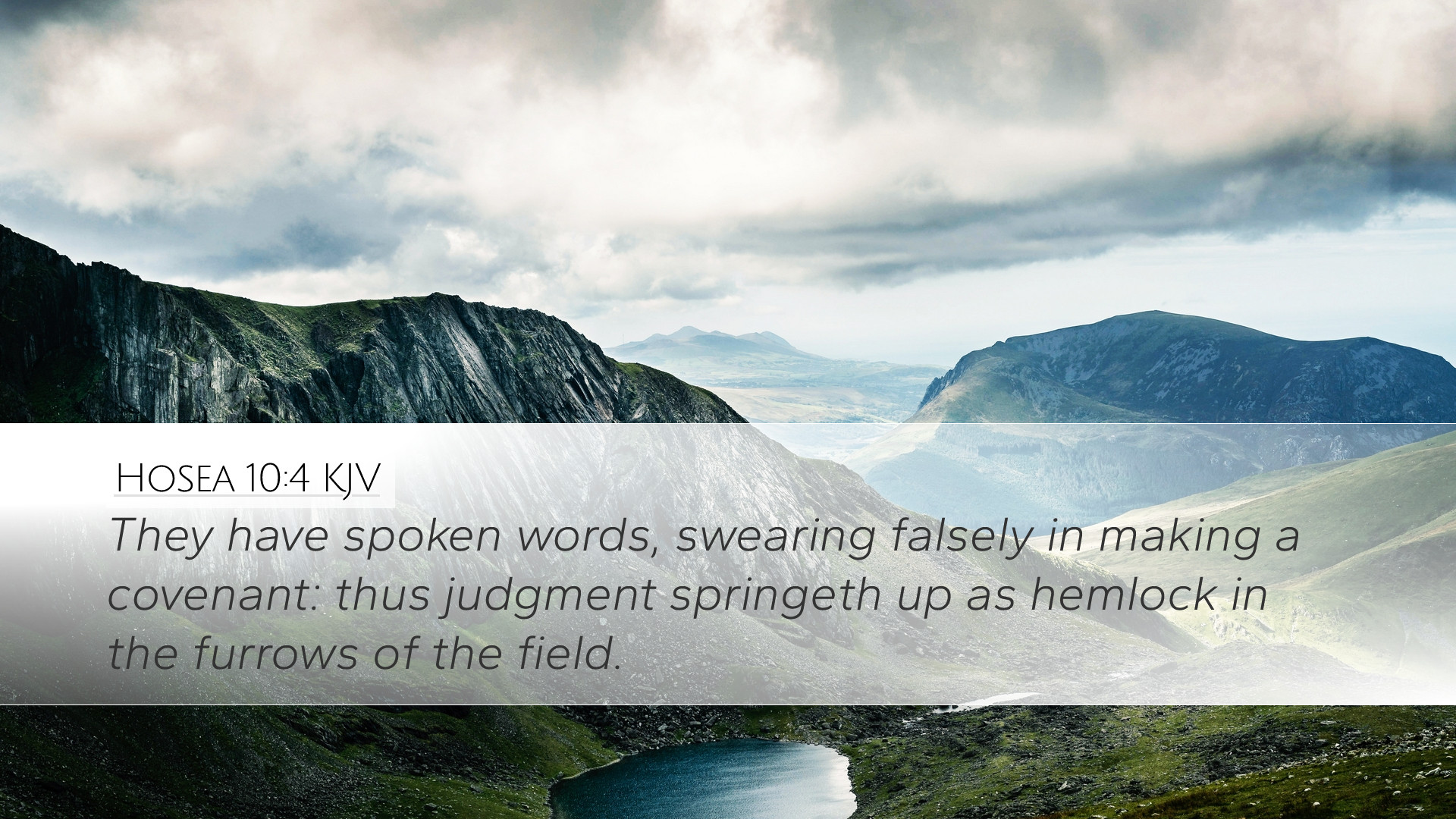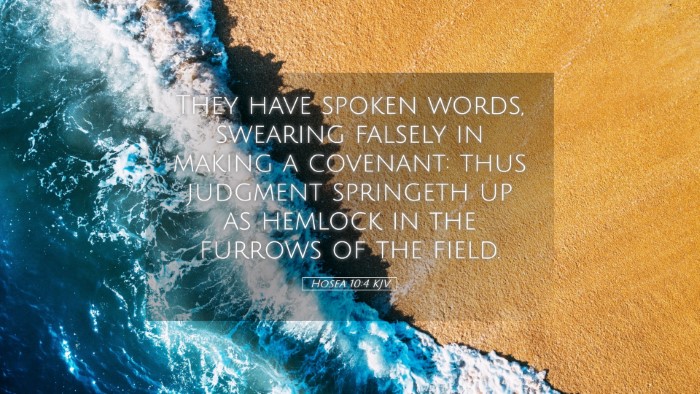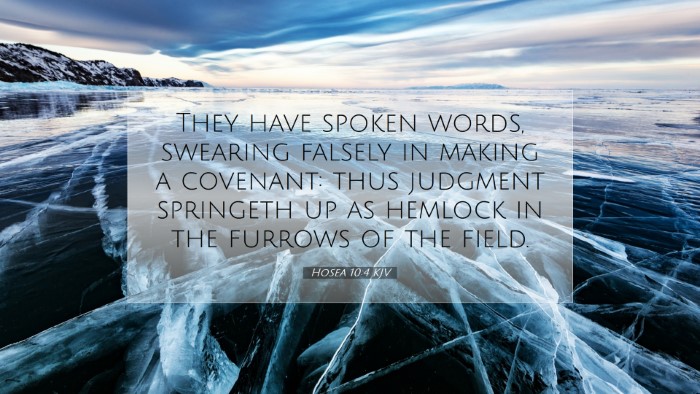Old Testament
Genesis Exodus Leviticus Numbers Deuteronomy Joshua Judges Ruth 1 Samuel 2 Samuel 1 Kings 2 Kings 1 Chronicles 2 Chronicles Ezra Nehemiah Esther Job Psalms Proverbs Ecclesiastes Song of Solomon Isaiah Jeremiah Lamentations Ezekiel Daniel Hosea Joel Amos Obadiah Jonah Micah Nahum Habakkuk Zephaniah Haggai Zechariah MalachiHosea 10:4
Hosea 10:4 KJV
They have spoken words, swearing falsely in making a covenant: thus judgment springeth up as hemlock in the furrows of the field.
Hosea 10:4 Bible Commentary
Commentary on Hosea 10:4
Text of Hosea 10:4: "They speak words, swearing falsely in making a covenant: thus judgment springeth up as hemlock in the furrows of the field."
Introduction
The book of Hosea is deeply poignant, revealing the tumultuous relationship between God and Israel. Hosea's prophetic messages illustrate Israel's infidelity and the consequent divine judgment. The verse under consideration, Hosea 10:4, encapsulates the themes of insincerity, false oaths, and impending punishment, making it a crucial text for understanding Hosea's overall message.
Summary of Insights
According to various public domain commentaries, Hosea 10:4 reflects the social and spiritual decay of Israel. The phrase "swearing falsely" highlights the nation's tendency towards deceit, particularly in their covenant relationships with God. This verse speaks volumes about the integrity, or lack thereof, in both their verbal commitments and their relationship with the Almighty.
Matthew Henry's Commentary
Matthew Henry emphasizes the seriousness of the offenses mentioned in this verse. He notes that the Israelites, while they outwardly professed faithfulness, engaged in deceitful practices—highlighting a profound hypocrisy. Henry points out that their covenant with God had been diluted with duplicity, as they sought to manipulate their relationship with God for personal gain.
Henry further explains that this behavior was not without consequence, as he delves into the phrase "judgment springeth up." He interprets this as a natural outcome of their unfaithfulness—similar to how weeds (hemlock) grow abundantly in a neglected field. This imagery underscores God's judgment, which arises from their own actions, suggesting that divine retribution is both imminent and inevitable.
Albert Barnes' Commentary
Albert Barnes provides a pastoral perspective, discussing the implications of the covenant violations. He engages with the concept of "making a covenant," arguing that the Israelites were treating their divine promises lightly. Barnes explains that this flippancy in oath-taking reflects a broader moral decline—a community determined to abandon true worship while still desiring God's blessings.
Moreover, Barnes draws attention to the phrase "thus judgment springeth up." He implies that the afflictions they endure are not random but arise directly from their choices. He suggests that the metaphor of hemlock—a poisonous plant—serves as a powerful reminder of the toxicity that sin can bring into one’s life, ultimately leading to destruction.
Adam Clarke's Commentary
In his analysis, Adam Clarke offers a deeper linguistic breakdown of the Hebrew text. He asserts that the phrase "they speak words" hints at an emptiness in their communication; their declarations lack sincerity and substance. Clarke links the act of swearing falsely to the broader theme of idolatry creeping into their societal fabric. He sees this verse as a warning against hollow promises that can lead to spiritual and social ruin.
Clarke also connects the imagery of hemlock to the concept of swift judgment, stressing that their actions will yield immediate reciprocal consequences. He argues that as they plant seeds of unrighteousness through deceptive speech, they will inevitably harvest a bitter crop.
Theological Implications
- The Nature of God’s Covenant: Hosea 10:4 reveals fundamental truths about God’s covenant relationship with His people. This covenant entails faithfulness, sincerity, and accountability, which Israel has repeatedly violated. This dissonance brings theological concern regarding the sanctity of divine promises.
- Consequences of Sin: The fierce imagery of judgment as hemlock serves as a stern reminder that actions have consequences. The careless promises made by Israel reflect a broader indifference to divine will, highlighting the seriousness with which God regards faithfulness.
- The Holistic Faith Experience: The dual focus of speech (words) and action (judgment) reminds the reader that genuine faith encompasses both belief and behavior. This reflects the broader scriptural assertion that faith without works is dead.
Application for Today’s Believers
As pastors, students, and theologians reflect on Hosea 10:4, several key applications arise that remain relevant in contemporary contexts:
- Integrity in Communication: Modern believers are called to reflect on their own words and vows. It is essential to practice authenticity and honesty when speaking of faith, commitments, and relationships—both with God and within the community.
- Understanding Judgment: The principle of sowing and reaping is timeless. Believers should be aware of the repercussions of their actions, recognizing how small deviations from God’s commands can lead to larger consequences in life.
- Affirmation of Covenant Faithfulness: Recognizing the gravity of God's covenant encourages believers to strive for deeper faithfulness in their spiritual walks. This demands an active effort to maintain integrity and righteousness, avoiding the pitfalls of spiritual laxity.
Conclusion
Hosea 10:4 presents a powerful reflection on the fragility and significance of covenant fidelity. Through insights drawn from the commentaries of Matthew Henry, Albert Barnes, and Adam Clarke, one can discern the depth of God’s message to His people—a call to integrity, sincere commitment, and awareness of the inevitable consequences that arise from our choices. This verse resonates across the ages, challenging today’s believers to remain steadfast in their vows and conscious of their spiritual walk before God.


